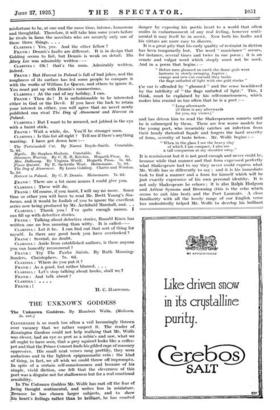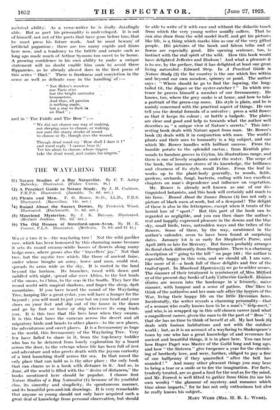THE UNKNOWN GODDESS
The Unknown Goddess. By Humbert Wolfe. (Methuen. 5s. net.) CLEVERNESS is so much too often a veil becomingly thrown over vacancy that we rather suspect it. The reader of .Kensington Gardens could not help realizing that Mr. Wolfe was clever, had an eye as pert as a robin's and saw, what we all ought to have seen, that a grey squirrel looks like a coffee- pot and that the Prince Consort finds his gilded cage of masonry oppressive. His small neat verses rang prettily, they were audacious and in the lightest epigrammatic vein : the kind of thing, in fact, we all wish we could throw off impromptu. In spite of a certain self-consciousness and because of his simple, vivid diction, one felt that the cleverness of this ,poet was a disguise not for shallowness but for a real emotional sensibility.
In The Unknown Goddess Mr. Wolfe has cast off the fear of 'being thought sentimental, and writes less in miniature. Because he has chosen larger subjects, and to show 1116 heart's feelings rather than be brilliant, he has courted danger by exposing his poetic heart to a world that often smiles in embarrassment of any real feeling, however senti- mental it may itself be in secret. Now both his faults and his virtues are more easy to discern.
It is a great pity that his early quality of restraint in diction has been temporarily lost. The word musicianer " occurs, for instance, several times and twice in one poem ; it is an ornate and vulgar word which simply must not be used. And in a poem that begins :—
" Before men gloomed on earth the flame-gods were lanterns in slowly-swinging Jupiter ;
orange and new-cut emerald they broke the flags unfurled of light with one gold stroke "
the ear is offended by `, gloomed " and the sense bewildered by the infelicity of " the flags unfurled of light." This, I think, must be explained by his self-consciousness, which makes him remind us to often that he is a poet :- "Long afterwards
(if there is any afterwards for you, my verses)," and has driven him to read the Shakespearean sonnets until he is submerged by them. There are few worse models for the young poet, who invariably catches an infection from their heady rhetorical facade and forgets the hard severity of form, severity of taste below. Mr. Wolfe begins :-
" When in the glass I see the heavy clay of which I am compact, I also see , a tall companion at my shoulder sway."
It is reminiscent but it is not good enough and never could be, because while that manner and that form expressed perfectly -what Shakespeare had to say they never could express what Mr. 'Wolfe has so differently to say ; and it is his immediate task to find a manner and a form for himself which will be just exactly expressive of his own personal identity. It is not only Shakespeare he echoes ; it is also Ralph Hodgson and Arthur Symons and Browning (this is the echo which seems to suit him best) and the Poet Laureate. A close familiarity with all the lovely range of our English verse has undoubtedly helped Mr. Wolfe to develop his brilliant -metrical ability. As a verse-writer- he' is daizlingly able. But as poet his persOnality is undeveloped. It is-out of himself, not out of the poets that have gone before him, that he must press his future work.' And he Must beware of artificial. paganism ; there are too many cupids and fluns -here now, and a tendency to the brittle and ornate such as long ago made much of Arthur Symons too sweet to be borne. 'A growing confidence in his own ability to make a unique statement will no doubt enable him soon "to- avoid these Ilippancies, as he already almost does in the-first- poem of this series " Iliad." There is frankneSs and conviction in the sense as well as delicate ease in the handling- of :—
" Not Helen's wonders nor Paris stirs
but the bright untender. hexameters.
And thus, all passion is nothing made, . but a star to flash in an Iliad " ; and in " The Fiddle and The Bow " :- " We did not choose our way of making, not sleeping ours to choose, or waking, not ours the starry stroke of sound • to choose or fly, though duns the wound.
Though dead wood cry How shall I dare it ? ' and wood reply ' I cannot bear it,' . Yet his alone to choose, whoSe fingers . take the dead wood, and makes his singers."











































 Previous page
Previous page